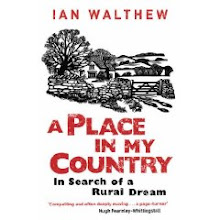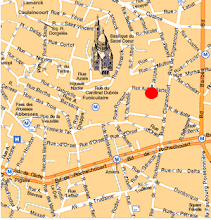Wednesday 30 July 2008
Book review: The End of Food
The End of Food
By Paul Roberts 390 pages.
$26. Houghton Mifflin Company.
Paul Roberts's prophetic and well-received 2004 book, "The End of Oil: On the Edge of a Perilous New World," anticipated the current energy crisis. Now he's moved on to what we put in our mouths. Roberts's new book, "The End of Food," which takes into account a vertiginous pile of recent developments - including the so-called tortilla riots of 2007, during which thousands took to the Mexico City streets to protest the rapidly rising cost of maize - may prove no less prescient.
A contributor to Harper's and other magazines, Roberts sketches a dire present and ponders a bleak future. We have reached the end of the "golden age" of food, he writes. No longer do the things we eat "grow only more plentiful, more secure, more nutritious and simply better with each passing year." Instead, E. coli outbreaks "have almost become an annual autumn ritual," and a new day is arriving when "cost and convenience are dominant, the social meal is obsolete" and the act of eating has "devolved into an exercise in irritation, confusion and guilt."
Roberts's worst-case scenario isn't tomatoes devoid of taste. It's a "perfect storm of sequential or even simultaneous food-related calamities." Climate change and spiraling population growth have him wondering not just "whether we'll be able to feed 9.5 billion people by 2070, but how long we can continue to meet the demands of the 6.5 billion alive today." Roberts delivers a litany of terrors small and large: "Arable land is growing scarcer. Inputs like pesticides and synthetic nitrogen fertilizers are increasingly expensive. Soil degradation and erosion from hyperintensive farming are costing millions of acres of farmland a year. Water supplies are being rapidly depleted in parts of the world, even as the rising price of petroleum - the lifeblood of industrial agriculture - is calling into question the entire agribusiness model."
Agribusiness and the industrial food it engenders have, of course, already attracted serious critics like Eric Schlosser's ("Fast Food Nation") and Michael Pollan ("Omnivore's Dilemma").
But they didn't finish the job. What eaters (and readers) still need, Roberts argues, "is a way to consider such critical questions and concerns in a larger, more global context." "The End of Food" wants to be what marketing wonks call a category killer, a book that trumps all other takes on the subject.
He gets about halfway there. Roberts is an expert at marshaling facts and collating figures, but a workmanlike writer. He travels to, among other food crisis flashpoints, Kenya and China. No matter the locale, Roberts measures inputs and outputs. And he draws conclusions from the differences. Our modern "food system can only truly be understood as an economic system," he argues, "one that, like all economic systems, has winners and losers, suffers periodic and occasionally profound instability and is plagued by the same inherent and irreducible gap between what we demand and what is actually supplied."
Late in the narrative, he reveals himself to be not a wild-eyed locavore, intent upon growing his own food and transforming the world economy in the process, but a moderate. In an epilogue, he suggests that we eat less meat and more farmed fish; support regional, instead of merely local, food systems; and work within the system to gain support for sustainable farming methods, while engaging the scientific community in open and honest debate about the possibilities of genetically modified crops.
After hundreds of pages of alarm-sounding and rabble-rousing, moderation seems like a curious position for a man who declares that our food production and distribution system is "so focused on cost reduction and rising volume that it makes a billion of us fat, lets another billion go hungry, and all but invites food-borne pathogens to become global epidemics." (- Reviewed by John T. Edge
http://www.iht.com/articles/2008/07/31/arts/bookthu.php
www.aplaceintheauvernge.blogspot.com
Farm Blogs
By Paul Roberts 390 pages.
$26. Houghton Mifflin Company.
Paul Roberts's prophetic and well-received 2004 book, "The End of Oil: On the Edge of a Perilous New World," anticipated the current energy crisis. Now he's moved on to what we put in our mouths. Roberts's new book, "The End of Food," which takes into account a vertiginous pile of recent developments - including the so-called tortilla riots of 2007, during which thousands took to the Mexico City streets to protest the rapidly rising cost of maize - may prove no less prescient.
A contributor to Harper's and other magazines, Roberts sketches a dire present and ponders a bleak future. We have reached the end of the "golden age" of food, he writes. No longer do the things we eat "grow only more plentiful, more secure, more nutritious and simply better with each passing year." Instead, E. coli outbreaks "have almost become an annual autumn ritual," and a new day is arriving when "cost and convenience are dominant, the social meal is obsolete" and the act of eating has "devolved into an exercise in irritation, confusion and guilt."
Roberts's worst-case scenario isn't tomatoes devoid of taste. It's a "perfect storm of sequential or even simultaneous food-related calamities." Climate change and spiraling population growth have him wondering not just "whether we'll be able to feed 9.5 billion people by 2070, but how long we can continue to meet the demands of the 6.5 billion alive today." Roberts delivers a litany of terrors small and large: "Arable land is growing scarcer. Inputs like pesticides and synthetic nitrogen fertilizers are increasingly expensive. Soil degradation and erosion from hyperintensive farming are costing millions of acres of farmland a year. Water supplies are being rapidly depleted in parts of the world, even as the rising price of petroleum - the lifeblood of industrial agriculture - is calling into question the entire agribusiness model."
Agribusiness and the industrial food it engenders have, of course, already attracted serious critics like Eric Schlosser's ("Fast Food Nation") and Michael Pollan ("Omnivore's Dilemma").
But they didn't finish the job. What eaters (and readers) still need, Roberts argues, "is a way to consider such critical questions and concerns in a larger, more global context." "The End of Food" wants to be what marketing wonks call a category killer, a book that trumps all other takes on the subject.
He gets about halfway there. Roberts is an expert at marshaling facts and collating figures, but a workmanlike writer. He travels to, among other food crisis flashpoints, Kenya and China. No matter the locale, Roberts measures inputs and outputs. And he draws conclusions from the differences. Our modern "food system can only truly be understood as an economic system," he argues, "one that, like all economic systems, has winners and losers, suffers periodic and occasionally profound instability and is plagued by the same inherent and irreducible gap between what we demand and what is actually supplied."
Late in the narrative, he reveals himself to be not a wild-eyed locavore, intent upon growing his own food and transforming the world economy in the process, but a moderate. In an epilogue, he suggests that we eat less meat and more farmed fish; support regional, instead of merely local, food systems; and work within the system to gain support for sustainable farming methods, while engaging the scientific community in open and honest debate about the possibilities of genetically modified crops.
After hundreds of pages of alarm-sounding and rabble-rousing, moderation seems like a curious position for a man who declares that our food production and distribution system is "so focused on cost reduction and rising volume that it makes a billion of us fat, lets another billion go hungry, and all but invites food-borne pathogens to become global epidemics." (- Reviewed by John T. Edge
http://www.iht.com/articles/2008/07/31/arts/bookthu.php
www.aplaceintheauvernge.blogspot.com
Farm Blogs
Labels:
Book
Subscribe to:
Post Comments (Atom)





















No comments:
Post a Comment